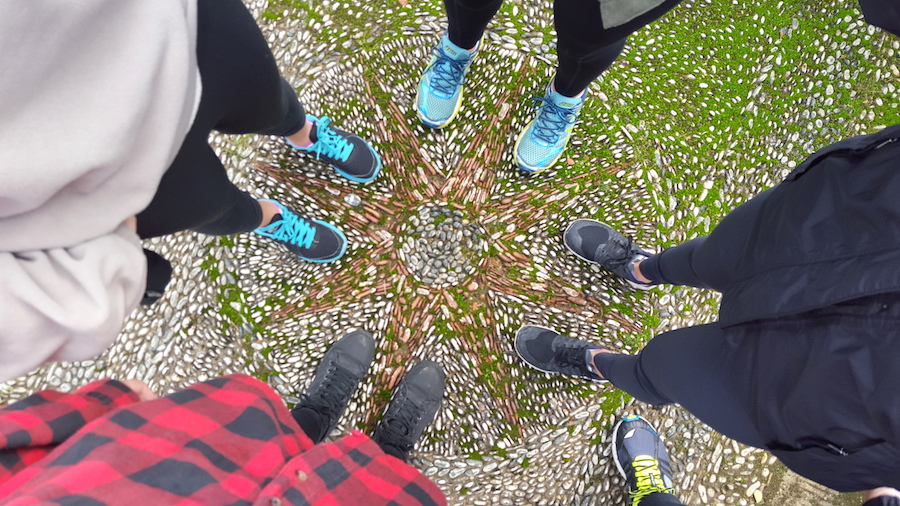I know, it’s not the most fun part of studying abroad, but it’s important that all students are well prepared for their experience, especially when it comes to safety. Use this quick guide to make sure you take the necessary steps to prepare!

SAI students at orientation
Before You Depart
The best you can do to ensure a safe time abroad, is to prepare before you depart! I know, it’s not a very exciting part of preparation, but I promise it’ll make you feel good.
- Research your host city and country. I suggest reading a local newspaper for a few weeks to get a sense of what is going on and how locals will perceive things. Every place is different so keep an open mind, and don’t be scared if you aren’t used to living in a large international city. While it may feel like more crime is occurring in cities, most people live very comfortably in their communities – it just takes getting to know it.
- Learn some basic language. It may sound like a lot, but you will feel so much more comfortable arriving in your host country if you are able to communicate a few important phrases. Practice them for a few weeks, and you’ll be golden – and locals will always love to see your effort!
- Create a communication plan with your loved ones. This is important, and something that many students don’t consider. There are two types of communication plans I’d like you to consider: general communication and crisis communication.
- General communication plan: have a chat with your loved ones about how often you expect to communicate with them when you’re abroad (be sure to check in with them when you arrive in your host country!). It can be helpful to plan on setting aside some time each week for a conversation. That way those at home don’t need to worry about not having heard back from you.
- Crisis communication plan: it’s also important to speak with your loved ones about crisis communication. If anything happens to either you or your loved ones at home, each other will want to be made aware of it as soon as possible. Make a plan for how you will contact each other should something urgent occur.
- Get a health check-up and fill any prescriptions. Schedule a general check-up with your doctor to make sure you are aware of any potential issues that could come up while you’re abroad. Also, if you take any prescription medicines, be sure to fill your prescriptions before you depart (see your pre-departure packet for more information on prescription medications).
- Become familiar with your health insurance. All SAI students are covered under GeoBlue student health insurance. You’ll receive information about your coverage before you depart. Make sure you read this information, and get to know your plan (but don’t worry, our on-site staff are very familiar with it, should you need to use it).
- Make copies of all your important documents. Make multiple copies of your passport, visa, credit cards, etc. Leave one copy at home with your parents, and bring a few with you. Make sure you always keep the copies in a safe place, but these will be a lifesaver in case you lose any items.
- Read your student handbook! This one speaks for itself, but don’t forget to read your student handbook – it’s full of valuable information about your host country and city.
- Make sure you are traveling with printed arrival information, housing information, and the contact information for your on-site staff. You’ll receive this before you depart.

This is the time of your life! Photo by SAI student Layah Weiss
When You Arrive
The first few days will feel like an absolute whirlwind as you meet new people, try to overcome jetlag, and learn a ton about your program. Make sure you do these few preliminary things, and you’ll be super safe!
- Watch the SAI safety video. You’ll receive a link to the SAI safety video. It’s short (5 minutes), but informative for those first few days, so make sure you watch it and take the information seriously. In particular, in those first few days, please don’t be out alone after dark and intoxicated. You have enough to handle with your jetlag and disorientation; give yourself some time to get to know your host city.
- Attend orientation (obviously!). This isn’t so much a suggestion as it is a requirement, but be sure you attend the whole orientation, as it will cover all sorts of safety items.
- Save important phone numbers in your phone. Be sure to save SAI’s emergency phone number in your phone. We are available 24 hours a day, 7 days a week to respond to any emergencies. Also, save all your roommates’ phone numbers in your phone. This will ensure that if someone is locked out, they’ll be able to get in without too much trouble.
- Write down your address in your phone. You’ll receive a lot of information those first few days, and remembering your address could be pretty hard. By saving your address in your phone you’ll always be able to reference it (and you’ll also be able to show it to a taxi driver if you’re not yet comfortable with the language).

SAI students on an adventure
While You’re Abroad
- Be conscious of how you are handling your money. Pickpocketing can be a problem in any tourist destination, and most study abroad locations are no exception. Be conscious of not carrying too many valuables with you as you’re about town, and make strategic decisions about withdrawing cash – keep those wads of cash in a safe place in your house, and walk around with just what you need ;)
- Talk to your roommates and housemates about safety in your housing. Make sure you have all discussed any concerns you have, and agree to certain safety steps. For example, discuss closing windows and doors, having guests over, giving your address to friends. It’s also a good idea to get to know your neighbors. It’s always nice to have relationships with locals, but they are also likely keeping tabs on the building, and can be a point of contact should you need it.
- Fill out the SAI travel Itinerary form when you take an overnight trip. You’ll get plenty of reminders to do this – but seriously, do it!
- Do plenty of research before you take trips. Know where you will be staying, prepare for your transportation and any back-ups, and be sure friends and family know where you’re going. If you want tips, pop into the SAI office for a chat – we love to help!
- Be responsive if we’re trying to reach you! In the unlikely event that there is a safety event that requires us to reach out to all students, please be as responsive as possible! Your safety is always our #1 priority, and we need to know that you’re ok.


Comments
No comments yet